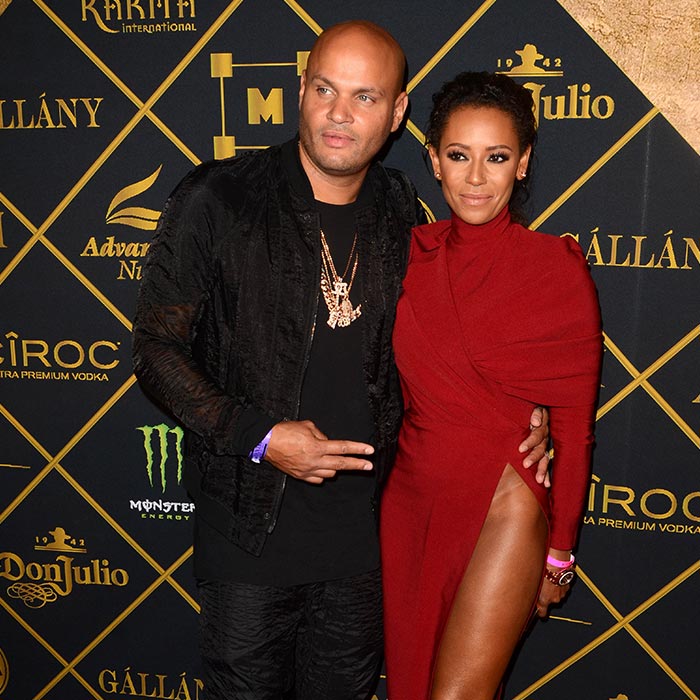(Provided images can't be used. The DepositPhoto images are "editorial use only," and Getty Images need to be purchased.)
Melanie “Mel B” Brown & Stephen Belafonte (California, 2017)



Former Spice Girl Mel B filed for divorce from Stephen Belafonte in 2017 amid allegations of domestic abuse, leading to a contentious custody battle over their young daughter. The case involved claims of physical and emotional violence and the issuance of a temporary restraining order, ultimately resulting in a joint custody arrangement despite the abuse allegations.
- Domestic Violence Prevention Act: allows a court to issue restraining orders for protection.
- Frequent Contact Policy Exception: if such contact would jeopardize the child or abused parent.
- Supervised Visitation: a court can order that visitation with a parent be supervised or restricted to protect the child.
Brad Pitt & Angelina Jolie (California, 2016)



Angelina Jolie filed for divorce from Brad Pitt in 2016, triggering a highly publicized multi-year custody battle over their six children. The dispute featured allegations of an altercation (the “plane incident”) leading to child welfare investigations, as well as issues of privacy (the parties utilized a private judge) and the eventual arrangement for joint custody after protracted litigation.
- Abuse Allegations Investigation: if a party alleges child abuse, the court may order an evaluation.
- Deterrence of False Claims: if a court finds that a parent knowingly made false abuse accusations with intent sanctions may apply.
- Private Judge Stipulation: The parties employed a privately compensated temporary judge for confidentiality.
- Court-Ordered Counseling: California courts may order parents and children to participate in counseling.
Jason Patric & Danielle Schreiber (California, 2012)



Actor Jason Patric’s battle with ex-girlfriend Danielle Schreiber centered on his efforts to be legally recognized as the father of their son, who was conceived via sperm donation. The case became a landmark paternity dispute in California, testing the limits of the state’s sperm donor laws and eventually prompting legal reforms to allow certain known donors to claim parental rights.
- Sperm Donor Parentage Rule: a semen donor for is not legally considered the father of a child with consent.
- Equal Treatment of Unmarried Parents: a child born outside of marriage has the same legal relationship with both parents.
- Legislative Reform (“Jason Patric Law”): The publicity of this case influenced California to clarify its statutes.
Tom Cruise & Katie Holmes (California/New York, 2012)



Katie Holmes’ surprise 2012 divorce filing against Tom Cruise initiated a swiftly resolved custody agreement over their daughter, Suri. Holmes filed in New York (where she had recently moved with Suri) rather than California, leading to speculation that jurisdictional strategy and concerns over Cruise’s religious practices (Scientology) played a role. The case concluded with Holmes obtaining primary custody and Cruise receiving generous visitation, all within about two weeks.
- Jurisdiction Under UCCJEA: New York assumed jurisdiction, California courts were required to defer.
- The Federal Parental Kidnapping Prevention Act: mandates that states give full faith and credit to other states’ custody orders.
- Joint vs. Sole Custody Doctrine: Braiman v. Braiman, 44 N.Y.2d 584 (1978), established that true joint custody is inappropriate in bitterly acrimonious divorces.
- Custody Settlements and Best Interests: The speed of this case owed much to a private settlement.
Halle Berry & Gabriel Aubry (California, 2010)



Halle Berry’s split from model Gabriel Aubry in 2010 led to a protracted custody dispute over their daughter, Nahla. A central issue was Berry’s desire in 2012 to relocate with Nahla to France (where Berry’s then-fiancé resided), which Aubry vigorously opposed. The California court ultimately blocked the international move, emphasizing the child’s need for stability and ongoing contact with both parents.
- “Move-Away” Requests: California law recognizes a custodial parent’s presumptive right to change a child’s residence.
- Best Interests Override: despite Berry being the primary caregiver, the court’s paramount consideration was Nahla’s best interests.
- International Considerations: judges may require “mirror” custody orders in the destination country or the posting of a custody bond to ensure the child’s return for visitation
- Custody Evaluation: the court ordered a comprehensive child custody evaluation by a mental health professional.
Jon & Kate Gosselin (Pennsylvania, June 2009)



Jon and Kate Gosselin’s 2009 divorce featured unique custody issues due to their eight children and intense media scrutiny. Initially, they adopted a “bird-nesting” arrangement, rotating parents rather than relocating children. Ultimately, primary custody went to Kate, with the court prioritizing sibling unity and stability over parental convenience, despite significant public drama surrounding their case.
- Sibling Unity Principle: Courts prefer keeping siblings together unless compelling reasons suggest otherwise.
- Bird-Nesting Arrangement: Courts can approve non-traditional custody setups if deemed best for children’s stability.
- Gender-Neutral Custody Decisions: Pennsylvania law avoids gender bias, focusing solely on child welfare criteria.
Britney Spears & Kevin Federline (California/Hawaii, November 2006)



Britney Spears and Kevin Federline’s custody dispute began in 2006, marked by Spears’ personal struggles and conservatorship. Federline gained full custody due to Spears’ mental health concerns but agreed to visitation. In 2023, Federline relocated to Hawaii with Spears’ consent. Their evolving arrangement underscores the flexibility courts maintain to modify custody as circumstances change.
- California Move-Away Law: Requires justification that relocation serves the child’s best interests, unless both parents agree.
- Best Interests & Parental Fitness: Courts prioritize child safety, limiting parental rights when mental health risks arise.
- Custody Order Flexibility: Ongoing jurisdiction allows modification of orders based on changing parental circumstances.
Charlie Sheen & Denise Richards (California, March 2005)



Charlie Sheen and Denise Richards’ 2005 divorce turned volatile amid allegations of substance abuse and violence by Sheen. Richards obtained a temporary restraining order, initially limiting Sheen to supervised visits. A private settlement was reached later, demonstrating California courts’ focus on child protection balanced with encouragement toward cooperative resolutions.
- Restraining Orders in Custody: Courts issue protective measures when allegations of abuse threaten child safety.
- Supervised Visitation: Conditions such as supervision are imposed until parent demonstrates rehabilitation.
- Court Jurisdiction & Ongoing Oversight: Courts retain authority for later adjustments, reflecting changes in circumstances.
Madonna & Guy Ritchie (New York/UK, October 2008)



Madonna and Guy Ritchie’s custody dispute over son Rocco escalated internationally when the teenager refused to return to New York from the UK in 2015. Legal action ensued in both countries. The courts emphasized Rocco’s own preferences, ultimately allowing him to stay primarily with Ritchie in London. This complex case highlighted international cooperation and the importance of older children’s preferences in custody determinations.
- International Jurisdiction (UCCJEA): Courts in different countries may coordinate to avoid conflicting custody orders.
- Child’s Preference Consideration: Older children's desires significantly influence custody and relocation outcomes.
- Settlement Encouragement: Courts actively promote parental agreement to avoid prolonged litigation impacts on children.
Elián González (Cuba/U.S., November 1999 – Unauthorized Abduction)



Six-year-old Elián González’s custody controversy became a landmark international dispute when he was rescued off Florida’s coast after his mother drowned fleeing Cuba. Relatives in Miami sought custody and asylum for Elián against his Cuban father’s wishes. U.S. federal courts ultimately ordered his return to Cuba, prioritizing parental rights and international legal principles above local sentiment and political pressure.
- Federal vs. State Jurisdiction: Immigration and international custody matters defer to federal rather than state courts.
- Primacy of Parental Rights: Courts affirm fit parents’ custody rights over relatives, barring clear evidence of unfitness.
- International Custody Enforcement: The U.S. reinforced international law principles, swiftly enforcing court orders despite local opposition.
Why These Cases Matter
High-profile relocation disputes do more than fill tabloids – they shape how we think about family law and influence real outcomes for parents and children everywhere. Why do these cases resonate so widely?
- Shaping Public Awareness: Celebrity cases bring custody and relocation issues into the spotlight. When we see a star struggling to get permission to move their child, it raises awareness about how complex and emotional these decisions can be. This visibility can encourage more parents to learn about their rights and options.
- Influencing Laws and Policy: Some famous disputes have directly led to changes in the law. For example, David Goldman’s ordeal helped spur the Goldman Act, strengthening U.S. responses to international child abductions. High-profile cases can motivate lawmakers to address gaps in the system so other families don’t suffer the same fate.
- Universality of Issues: Perhaps most importantly, these stories remind us that wealth and fame don’t exempt anyone from the challenges of co-parenting. A movie star and a middle-class mom both have to prove what’s best for their child in court. The same principles – like the best interests of the child – apply in every case. Seeing celebrities go through it humanizes the legal process and creates empathy for all families in conflict.
Common Legal Issues Behind the Headlines
Beyond the drama, most of these cases boil down to a few key legal questions. Understanding these common issues can help demystify your own situation:
- Relocation & “Best Interests” Standard: Judges must decide if a move truly benefits the child. Every state (and country) applies a best interests of the child test. In cases like Halle Berry’s, even a parent’s exciting opportunity (or new marriage abroad) wasn’t enough to outweigh the loss of day-to-day contact with the other parent.
- Jurisdiction Battles: Where a case is decided can affect the outcome. Parents sometimes rush to file in a particular state or country they think will be favorable (as Katie Holmes did in New York). Internationally, treaties like the Hague Convention determine which country’s courts hear an abduction case. Jurisdiction wrangling was central in Kelly Rutherford’s and Elian González’s situations.
- Parental Abduction vs. Lawful Relocation: There’s a stark line between legally relocating with court approval and unlawfully taking a child. Cases labeled Unauthorized Abduction involve one parent violating orders – a criminal act as well as a civil matter. These contrast with permitted moves that follow proper procedure and notice.
- Allegations of Abuse or Unfitness: Many celebrity custody fights involve claims of substance abuse, domestic violence, or poor parenting (think Charlie Sheen’s public issues or the accusations in Pitt vs. Jolie). Courts have to sift fact from fiction. Valid concerns can tip custody in favor of the safer parent or lead to supervised visitation.
- Evolving Family Circumstances: Time can change everything. A relocation that was off-limits during a divorce might be allowed a few years later, or vice versa. Kids grow up (as with Madonna’s son choosing Dad’s home) and their needs evolve. Courts can modify orders when there’s a significant change in circumstances.
What Parents Can Learn
While your life may not play out on a public stage, there are takeaways from these cases that any parent (or grandparent) can use:
- Keep It Child-Centered: In every case, the families that fared best kept the focus on the kids’ well-being. Ask yourself, “What arrangement will help my child thrive?” and let that guide your decisions.
- Communicate and Co-Parent if Possible: Not all these couples could get along, but the ones who found compromise (like Cruise and Holmes’s speedy agreement) spared their child a lot of chaos. If you can safely communicate with your co-parent, try to work out a plan together or through mediation.
- Document and Be Prepared: These high-stakes stories show the importance of good documentation and legal help. If you anticipate a move or foresee conflict, start gathering relevant records (school notes, doctor’s letters, a proposed schedule) and consult a lawyer who knows relocation cases.
- Stay Calm and Civil: It’s natural to feel angry or hurt, but letting emotions explode (especially in public or online) can harm your case. Take deep breaths, lean on support from friends or a therapist, and present your best self during proceedings.
- Know Your Rights and Limits: Learn about the relocation laws in your state and any international rules if moving abroad might be an issue. Understand that you usually can’t move a child out of the area without permission from the other parent or the court.
Moving Forward: Support and Resources
You don’t have to navigate relocation and custody challenges alone. ChildRelocation360 offers a community of information and support for families and professionals alike:
- Visit the Legal Directory – Connect with experienced family law attorneys and relocation specialists in your area. Finding the right professional help can make all the difference in a complex case.
- Learn More Through CLE & CE Courses – Expand your knowledge with expert-led classes. We offer Continuing Legal Education for attorneys and Continuing Education for mental health professionals, focused on ethical, effective ways to handle relocation and custody issues.
With the right knowledge and support, you can approach even the toughest custody decisions with confidence. Every family’s situation is unique, but by learning from others and staying child-focused, you’re better equipped to ensure your child can thrive – no matter what changes lie ahead.

